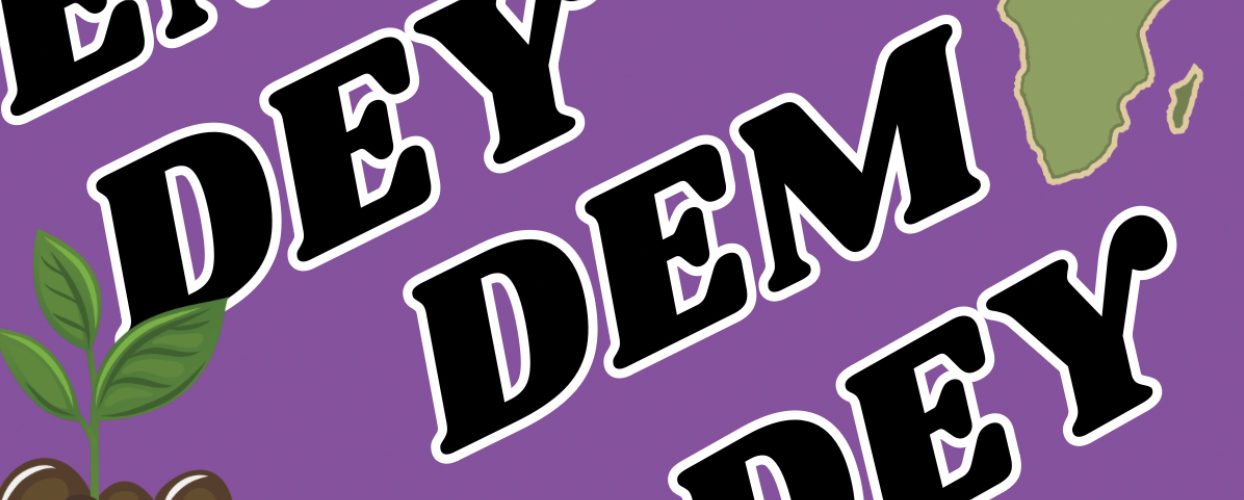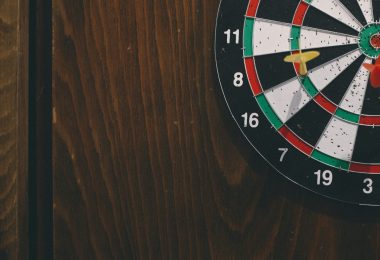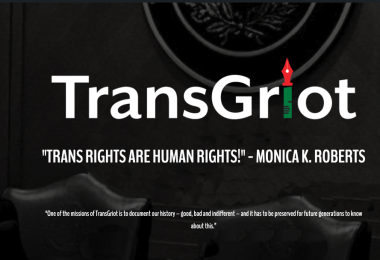“This User uses Dey/Dem Pronouns.”
Neo-pronouns are often a topic of contention and contempt. For those still getting the hang of — or refusing to get the hang of — they/them/theirs, neo-pronouns like Xe and Zir probably elicit deep-seated negative emotional reactions.
In the colonial world that has fallen on us, there are two genders and there are two sets of pronouns. The masculine (he/him/él) and the feminine (she, hers, ella, elle). In many of our Indigenous worldviews, there are multitudinous ways of being. For Black people, many if not all of our Indigenous languages have one pronoun used for all. So when it comes to gender-neutral pronouns, we not new to this, we true to it.
Dey/ Dem /Dey is a pronoun set that really began to be discussed as a Black-exclusive pronoun as early as 2021. It follows the sound system that many of the diaspora can relate to. The “th” sound is not a common feature in many West and Central African languages so it did not carry over into many manifestations of Black speech either during the slave trade and/or colonization. A common sound shift, the “th” sound becomes the “d” sound at the beginning of the word. They becomes Dey.
In Ebonics, Dey is the most commonly used gender-neutral pronoun. So it is not really a “Neo”-pronoun but tradition being carried over. It also has versatility and can be used in other diasporic languages like Nigerian Pidgin and Patwa.
There is a significant lack of English-language scholarship on Niger-Congo languages and the African Pidgin Language Family. The small amount of scholarship and web-based conversation confirms that our languages are typically gender-neutral and not sex-based. The Western sex/gender binary is a colonial imposition that has affected even our everyday language.
So what makes Dey/Dem pronouns special?
The last decade brought a lot of visibility to trans communities. Black trans communities are being affected in ways both good and bad by this. One of the good things is that we have been able to discuss among ourselves how we want one another to refer to us. Dey/Dem is just one of the plethora of ways that have emerged from these discussions.

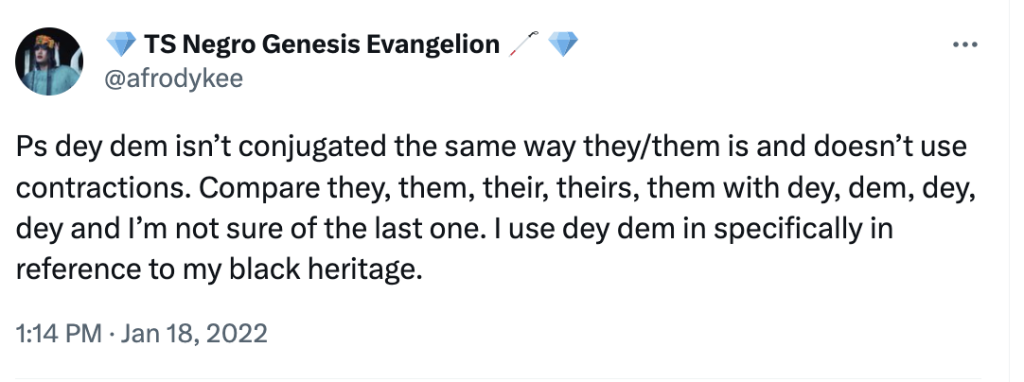
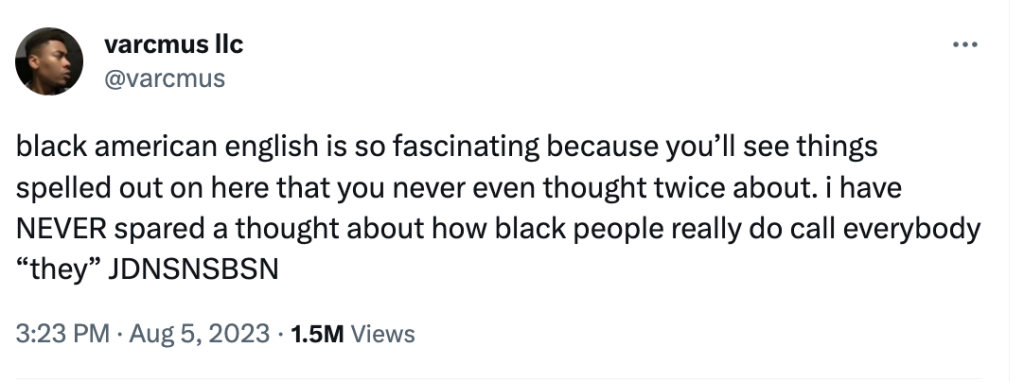
Black gender variant communities are often erased by cis-hetero narratives of Blackness and white/nonblack LGBT movements. If we are mentioned, we are tokenized (for example: Marsha P. Johnson). Dey/ Dem pronouns are one way we continue to create our own narratives, reestablish our autonomy, and stay connected to our cultures.
Who USES Dey/Dem Pronouns and Who CAN use dem?
For this section I interviewed two people who use Dey/Dem pronouns and ran a poll with the same questions for others to participate as well. A small selection of people (15) answered.
Here are the eight questions asked:
- What is your name (letter for anonymity)
- What are your pronouns
- Do you use dey/dem pronouns
- Why do you use dey/dem pronouns
- When did you start using them?
- What do you believe is the future for Black exclusive neo pronouns
- Who can use dey/dem pronouns
Interview with Moco (@Rootinnajumieka on IG)
What is your name (letter for anonymity)?
Moco: I go by many names depending on who I’m talking to. {My names are} Moco, Ndummiri, Odogwu, Kwadwo.
What is your ethnicity or cultural background?
Moco: Jamaican, & I guess you can say my “clan” is Jamaican-Panamanian.
Do you use Dey/Dem pronouns?
Moco: I use Dey/Dem as well as any & all diasporic gender-neutral pronouns
When did you start using dem?
Moco: I started using dem, in 2020. It felt so euphoric cuz I feel this sense of relief that now ppl cannot gender me without my permission.
Why do you use Dey/Dem pronouns?
Moco: I use dey/dem bc it’s how most black ppl talk anyhow. No matter where they are in the diaspora, that’s what they’ll say anyway. Especially since gendered pronouns are not even a thing in our languages, so literally they won’t be changing anything about their speech
Who can use Dey/Dem/Dey Pronouns?
Moco: Niggas. Black folk globally drop the th & add d. Plus black trans folk have started to type it out this way. It is ours. Everyone else better mek sure their tongue & teeth join for that TH emphasis
What do you believe is the future for Black Language and Gender Neutral Pronouns/ “neo” Pronouns?
Moco: As much as colonialism has affected how we engage gender, all of our languages have already been gender neutral. For those unaware, I’d implore them to look into it & re-claim them. I honestly think “neo” (which mean new of course) was created by nonblack, particularly white trans ppl bc their languages are gendered asf so they had to literally make some new ones on a whim. Africans aint have to do that & as long as we cherish our languages & not adhere to European languages & speech, neutral pronouns not going no where
Interview with E(@Fromtheethers on IG)
What’s your name?
E: {My name is } E
Where you from / What’s your cultural background?
E: [I’m] from Florida. My two major lineages of my family come from the Chesapeake and Lowcountry.
What pronouns do you use?
I use dey/dem. E, she, he, everythang. Literally everythang.
When did you start using Dey/Dem pronouns?
E: [ I started using dem in] 2020. I started being more curious about my gender. I still feel I am a woman but I don’t conform to linear forms of womanhood. *Chuckles small* I believe my Chi issa ole man, so to honor my whole self I use dey/dem pronouns to convey that.
Who can use Dey/Dem pronouns?
E: I say, Black people. That’s our speech patterns. I use it for all people because Ebonics/ African American speech patterns is constantly delegitimized. I believe Black people should use them only because most diasporic language already uses them.
What do you believe is the future for Black Language and Gender Neutral Pronouns/ “neo” Pronouns?
E: It’s pretty much a part of our language. I do believe in self-identification and that people should be able to create language to best describe themselves. Language should and can evolve but dey/dem is already a staple in Black language.
Conclusion
The poll received many of the same responses and is available for viewing here.
Pronouns are a big discussion when it comes to transness. As Black people, we have been thrown into speaking colonial languages that never considered our whole being, but we still continue to practice what’s true to us moving forward. Language is just one part of that!

